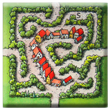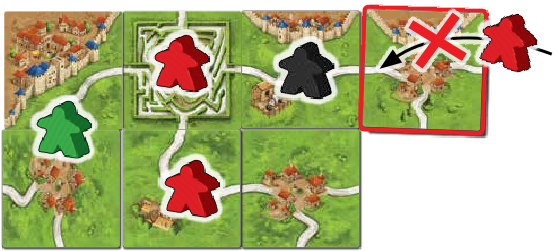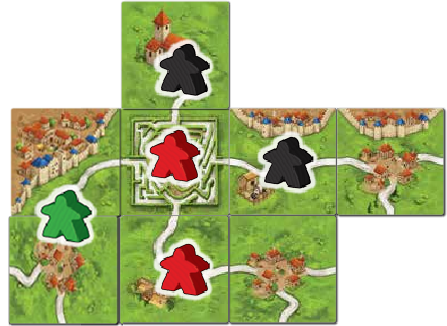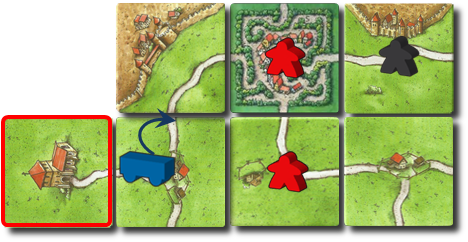The Labyrinth
 |
You are reading the rules for this tile design. |  |
| If your tiles have a different design, then choose a game from Spin-offs. |  |
General info and comments
The Labyrinths was originally released by Spiel Doch! in 2016.
Issue 1/2016 of the Spiel Doch! magazine contained two new tiles for Carcassonne. One has been illustrated in the style of the 1st edition by Doris Matthäus, the other in the style of the 2nd edition by Anne Pätzke. Both tiles can be used in all editions. Combinations with other expansions and mini-expansions are not completely tested and there are no official rule explanations covering such cases.
Spiel Doch! provided a basic set of rules and HiG released a variant for advanced players available on their website at the time of release.
Contents
- 2 landscape tiles, one 1st Ed. Carcassonne and another for 2nd Ed. Carcassonne
Rules
Preparation
Mix the Labyrinth tile(s) with the other landscape tiles.
Gameplay
1. Placing a tile
If you draw a labyrinth, you place it according to the normal rules.
2. Placing a meeple
 Basic rules
Basic rules
When you place a labyrinth tile, you are allowed to put a meeple on it (also in compliance with the standard rules). [1] The labyrinth is not a crossing; all outgoing roads are interconnected. Consequently, a meeple can only be placed on it if all the roads connected to the labyrinth tile are unoccupied. [2] The meeple then is a thief on all the connected roads.
 Advanced variant
Advanced variant
Since the labyrinth makes the connections of the roads quite unmanageable, the placing of meeples is regulated differently in this variant. If you place the labyrinth, you may place a meeple on it even if there is already a meeple on one or more connected roads. [2] It does not matter who owns those meeples.
As you progress through the game, if you place a tile at an exit of the labyrinth that does not have a meeple yet, you may place a meeple there, even though the network of roads and the labyrinth itself may have a meeple.
If you add a road to an existing road that already has a meeple on it, a meeple cannot be placed on it (as usual). The labyrinth and the four outgoing roads are the exceptions.
3. Scoring a feature
 Basic rules
Basic rules
The labyrinths are scored according to the normal Carcassonne rules for roads during the game and after the game.
 Advanced variant
Advanced variant
The labyrinth and the connected roads are scored when all 4 of the roads are completed. The player with the majority on the labyrinth and the connected roads will get 1 point for each tile as usual. In addition, he or she will get 2 points for each meeple standing on the labyrinth or on a connected road. If several players have the majority, each of them gets the full number of points. [3]
Final Scoring
The labyrinths are scored according to the normal Carcassonne rules for roads. You get no additional points from the meeples placed on the labyrinth network.
Interactions with other expansions
This section summarizes the interaction of The Labyrinth with other expansions:
These interactions are described as a series of cases where the points you get from the road tiles (including the labyrinth) vary depending on the expansions involved. Independently of how these points are modified, if playing with the advanced rules, the bonus points for the meeples on the road do not change in any case when scoring the feature.
- Case 0 - Regular labyrinth: If a labyrinth is completed, you will get 1 point for each road tile including the labyrinth itself. An incomplete labyrinth at the end of the game is worth 1 point for each tile including the labyrinth itself.
- Case 1 - Inns & Cathedrals: If a labyrinth is completed and contains one or more inns (inns do not stack) and you have the majority, you will get 2 points instead of 1 point for each road tile including the labyrinth itself. An incomplete labyrinth with an inn(s) at the end of the game is worth 0 points for each tile including the labyrinth itself.
- Case 2 - German Cathedrals: If a labyrinth is completed and one or more of its roads end at a German Cathedral (German Cathedrals do not stack) and you have the majority, you will get 2 points instead of 1 point for each road tile including the labyrinth itself. An incomplete labyrinth with one or more of its roads ending at a German Cathedral at the end of the game is worth 1 point per tile including the Labyrinth itself.
- Case 3 - Inns & Cathedrals + German Cathedrals: If a labyrinth is completed and contains one or more inns and one or more of its roads end at a German Cathedral and you have the majority, you will get 3 points instead of 1 point for each road tile including the labyrinth itself. An incomplete labyrinth with an inn(s) at the end of the game is worth 0 points.
The following table describes the same information in a more schematic way. Take into account that road segments on German Cathedral tiles are counted separately and get the same points as any road tile in Cases 2 & 3.
| Scenario | Regular Labyrinth | Inns and Cathedrals | German Cathedrals | Scoring a feature | Final scoring |
|---|---|---|---|---|---|
| No other expansions involved | There are one or more inns on its roads (inns do not stack) | One or more of its roads end up at a German Cathedral (German cathedrals do not stack) | You have meeple majority of the completed labyrinth | You have meeple majority of the incomplete labyrinth | |
| Points from road tiles including the labyrinth (road segments on German Cathedral tiles are counted separately in Cases 2 & 3) | |||||
| Case 0 | X | 1 point / tile | 1 point / tile | ||
| Case 1 | X | 2 points / tile | 0 points / tile | ||
| Case 2 | X | 2 points / tile | 1 point / tile | ||
| Case 3 | X | X | 3 points / tile | 0 points / tile | |
| Other modifiers applicable following the order of evaluation (German Cathedral tiles are counted as normal tiles) | |||||
| Mage on the road | Any | Any | Any | (+1) point / tile | (+1) point / tile |
| Witch on road | Any | Any | Any | 1/2 points (rounded up) | 1/2 points (rounded up) |
| Meeple on Wainwrights Quarter (Markets of Leipzig) | Any | Any | Any | (+1) point / tile | (+0) point / tile |
| Points from meeples placed on road tiles and the labyrinth (advanced rules only) | |||||
| All cases | Any | Any | Any | 2 point / meeple | 0 point / meeple |
Tile distribution
Footnotes
For Icons explanation and licensing please visit Icons page.
- ↑
 This means you can place a meeple on the labyrinth as a highwayman or on any of the four unoccupied field strips surrounding the labyrinth as a farmer.
This means you can place a meeple on the labyrinth as a highwayman or on any of the four unoccupied field strips surrounding the labyrinth as a farmer.
- ↑ 2.0 2.1
 A meeple can be placed on an incomplete labyrinth network by other means. A wagon placed on a completed neighboring feature or any meeple via a magic portal or a flying machine can be deployed to:
A meeple can be placed on an incomplete labyrinth network by other means. A wagon placed on a completed neighboring feature or any meeple via a magic portal or a flying machine can be deployed to:
- An unoccupied road network with a labyrinth (basic rules).
- An unoccupied labyrinth tile or road segment (advanced variant rules).
- ↑
 Labyrinth tiles do not stack, the same as inns on roads. A road network with more than one labyrinth will be scored as one single feature and the additional points provided per meeple will be received only once for the whole road network, not once per labyrinth tile.
Labyrinth tiles do not stack, the same as inns on roads. A road network with more than one labyrinth will be scored as one single feature and the additional points provided per meeple will be received only once for the whole road network, not once per labyrinth tile.










